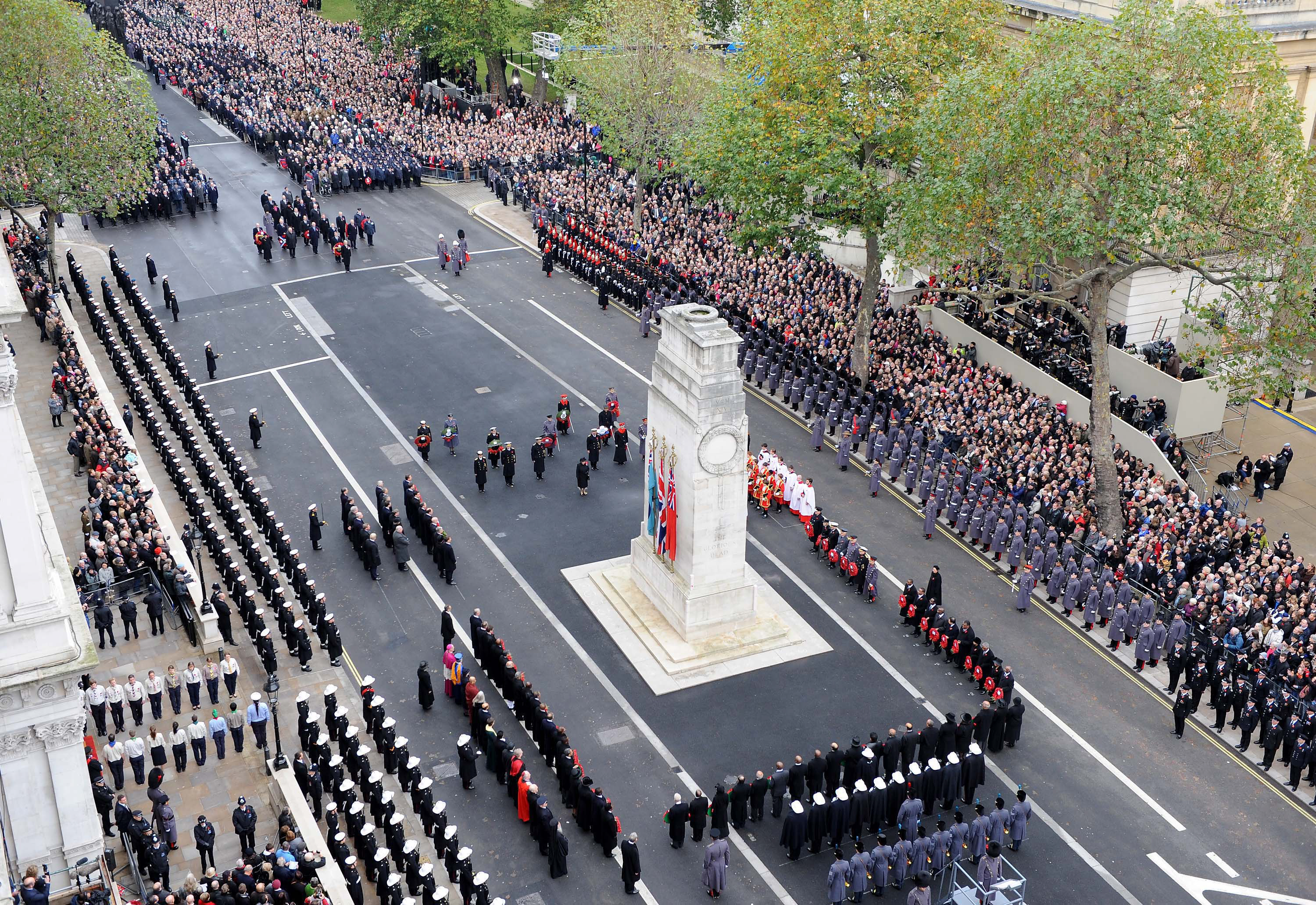|
Allhallowtide
Allhallowtide, Hallowtide, Allsaintstide, or the Hallowmas season, is the Western Christian season encompassing the triduum of All Saints' Eve (Halloween), All Saints' Day (All Hallows') and All Souls' Day, as well as the International Day of Prayer for the Persecuted Church (observed on the first Sunday of November) and Remembrance Sunday (observed on the second Sunday in November) in some traditions. The period begins on 31 October annually. Allhallowtide is a "time to remember the dead, including martyrs, saints, and all faithful departed Christians." The present date of Hallowmas (All Saints' Day) and thus also of its vigil (Hallowe'en) was established for Rome perhaps by Pope Gregory III (731–741) and was made of obligation throughout the Frankish Empire by Louis the Pious in 835. Elsewhere, other dates were observed even later, with the date in Ireland being 20 April. In the early 11th century, the modern date of All Souls' Day was popularized, after Abbot Odilo establishe ... [...More Info...] [...Related Items...] OR: [Wikipedia] [Google] [Baidu] |
Halloween
Halloween or Hallowe'en (less commonly known as Allhalloween, All Hallows' Eve, or All Saints' Eve) is a celebration observed in many countries on 31 October, the eve of the Western Christian feast of All Saints' Day. It begins the observance of Allhallowtide, the time in the liturgical year dedicated to remembering the dead, including saints ( hallows), martyrs, and all the faithful departed. One theory holds that many Halloween traditions were influenced by Celtic harvest festivals, particularly the Gaelic festival Samhain, which are believed to have pagan roots. Some go further and suggest that Samhain may have been Christianized as All Hallow's Day, along with its eve, by the early Church. Other academics believe Halloween began solely as a Christian holiday, being the vigil of All Hallow's Day. Celebrated in Ireland and Scotland for centuries, Irish and Scottish immigrants took many Halloween customs to North America in the 19th century,Brunvand, Jan (editor). ... [...More Info...] [...Related Items...] OR: [Wikipedia] [Google] [Baidu] |
All Souls' Day
All Souls' Day, also called ''The Commemoration of All the Faithful Departed'', is a day of prayer and remembrance for the faithful departed, observed by certain Christian denominations on 2 November. Through prayer, intercessions, alms and visits to cemeteries, people commemorate the poor souls in purgatory and gain them indulgences. In Western Christianity, including the Roman Catholicism and certain parts of Lutheranism and Anglicanism, All Souls' Day is the third day of Allhallowtide, after All Saints' Day (1 November) and All Hallows' Eve (October 31). Before the standardization of Western Christian observance on 2 November by St. Odilo of Cluny in the 10th century, many Catholic congregations celebrated All Souls Day on various dates during the Easter season as it is still observed in some Eastern Orthodox Church, Eastern Catholic and Eastern Lutheran churches. Churches of the East Syriac Rite (Syro-Malabar Catholic Church, Chaldean Catholic Church, Assyrian Church of ... [...More Info...] [...Related Items...] OR: [Wikipedia] [Google] [Baidu] |
International Day Of Prayer For The Persecuted Church
The International Day of Prayer for the Persecuted Church (often abbreviated as IDOP) is an observance within the Christian calendar in which congregations pray for Christians who are persecuted for their faith. It falls on the first Sunday of November, within the liturgical period of Allhallowtide, which is dedicated to remembering the martyrs and saints of Christianity. The International Day of Prayer for the Persecuted Church is observed by many Christian denominations, with over 100,000 congregations honoring the holiday worldwide. Congregations focus on "praying for individuals, families, churches, or countries where Christians are facing hard situations." Additionally, many congregations donate funds from their collection of tithes and offerings on the International Day of Prayer for the Persecuted Church to NGOs that support human rights of persecuted Christians, such as Voice of the Martyrs, International Christian Concern, and Open Doors. History The persecutio ... [...More Info...] [...Related Items...] OR: [Wikipedia] [Google] [Baidu] |
Hallowmas
All Saints' Day, also known as All Hallows' Day, the Feast of All Saints, the Feast of All Hallows, the Solemnity of All Saints, and Hallowmas, is a Christian solemnity celebrated in honour of all the saints of the church, whether they are known or unknown. From the 4th century, feasts commemorating all Christian martyrs were held in various places, on various dates near Easter and Pentecost. In the 9th century, some churches in the British Isles began holding the commemoration of all saints on 1 November, and in the 9th century this was extended to the whole Catholic church by Pope Gregory IV. In Western Christianity, it is still celebrated on 1 November by the Roman Catholic Church as well as many Protestant churches, as the Lutheran, Anglican, and Methodist traditions. The Eastern Orthodox Church and associated Eastern Catholic and Eastern Lutheran churches celebrate it on the first Sunday after Pentecost. The Syro-Malabar Church and the Chaldean Catholic Church, both of who ... [...More Info...] [...Related Items...] OR: [Wikipedia] [Google] [Baidu] |
All Saints' Day
All Saints' Day, also known as All Hallows' Day, the Feast of All Saints, the Feast of All Hallows, the Solemnity of All Saints, and Hallowmas, is a Christian solemnity celebrated in honour of all the saints of the church, whether they are known or unknown. From the 4th century, feasts commemorating all Christian martyrs were held in various places, on various dates near Easter and Pentecost. In the 9th century, some churches in the British Isles began holding the commemoration of all saints on 1 November, and in the 9th century this was extended to the whole Catholic church by Pope Gregory IV. In Western Christianity, it is still celebrated on 1 November by the Roman Catholic Church as well as many Protestant churches, as the Lutheran, Anglican, and Methodist traditions. The Eastern Orthodox Church and associated Eastern Catholic and Eastern Lutheran churches celebrate it on the first Sunday after Pentecost. The Syro-Malabar Church and the Chaldean Catholic Church, bot ... [...More Info...] [...Related Items...] OR: [Wikipedia] [Google] [Baidu] |
Triduum
A triduum (plural: ''tridua'') is a religious observance lasting three days. Major tridua The best-known and most significant example today is the liturgical Paschal Triduum (the three days from the evening of Maundy Thursday to Easter Sunday). Other liturgical tridua celebrated in Western Christianity include the Rogation Days preceding Ascension Thursday, the feasts of Christmas and Pentecost together with the first two days of their octave, and Allhallowtide that lasts from Halloween to All Souls Day. In Eastern Christianity (both Orthodox and Catholic) the analogues of festive tridua take the form of a major feasts followed by an associated Synaxis. The most publicly celebrated examples are the feast of Epiphany together with its eve and the following day dedicated to Saint John the Baptist, and the Nativity feast with Christmas Eve and the Synaxis of Theotokos. Ecclesiastical approval has been granted for tridua in honour of the Trinity, the Eucharist and Sai ... [...More Info...] [...Related Items...] OR: [Wikipedia] [Google] [Baidu] |
Remembrance Sunday
Remembrance Sunday is held in the United Kingdom as a day to commemorate the contribution of British and Commonwealth military and civilian servicemen and women in the two World Wars and later conflicts. It is held on the second Sunday in November (the Sunday nearest to 11 November, Armistice Day, the anniversary of the end of hostilities in World War I in 1918). Remembrance Sunday, within the Church of England, falls in the liturgical period of Allsaintstide. It is marked by ceremonies at local war memorials in most cities, towns and villages, attended by civic dignitaries, ex-servicemen and -women (many are members of the Royal British Legion and other veterans' organisations), members of local armed forces regular and reserve units (Royal Navy and Royal Naval Reserve, Royal Marines and Royal Marines Reserve, Army and Territorial Army, Royal Air Force and Royal Auxiliary Air Force), military cadet forces (Sea Cadet Corps, Army Cadet Force and Air Training Corps as well ... [...More Info...] [...Related Items...] OR: [Wikipedia] [Google] [Baidu] |
Hallow
To hallow is "to make holy or sacred, to sanctify or consecrate, to venerate". The adjective form ''hallowed'', as used in ''The Lord's Prayer'', means holy, consecrated, sacred, or revered. The noun form ''hallow'', as used in ''Hallowtide'', is a synonym of the word saint. The word 'to hallow' itself in English is now archaic; does not appear other than in the quoted text in the Lord's Prayer in the New Testament ( and ). Etymology The noun is from the Old English adjective ''hālig'', nominalised as ''se hālga'' "the holy man". The Gothic word for "holy" is either ''hailags'' or ''weihaba'', ''weihs''. "To hold as holy" or "to become holy" is ''weihnan'', "to make holy, to sanctify" is ''weihan''. Holiness or sanctification is ''weihiþa''. Old English, like Gothic, had a second term of similar meaning, ''wēoh'' "holy", with a substantive ''wīh'' or ''wīg'', Old High German ''wīh'' or ''wīhi'' (Middle High German ''wîhe'', Modern German ''Weihe''). The Nordendo ... [...More Info...] [...Related Items...] OR: [Wikipedia] [Google] [Baidu] |
Old English
Old English (, ), or Anglo-Saxon, is the earliest recorded form of the English language, spoken in England and southern and eastern Scotland in the early Middle Ages. It was brought to Great Britain by Anglo-Saxon settlers in the mid-5th century, and the first Old English literary works date from the mid-7th century. After the Norman conquest of 1066, English was replaced, for a time, by Anglo-Norman (a relative of French) as the language of the upper classes. This is regarded as marking the end of the Old English era, since during this period the English language was heavily influenced by Anglo-Norman, developing into a phase known now as Middle English in England and Early Scots in Scotland. Old English developed from a set of Anglo-Frisian or Ingvaeonic dialects originally spoken by Germanic tribes traditionally known as the Angles, Saxons and Jutes. As the Germanic settlers became dominant in England, their language replaced the languages of Roman Britain: Com ... [...More Info...] [...Related Items...] OR: [Wikipedia] [Google] [Baidu] |
Christmastide
Christmastide is a season of the liturgical year in most Christian churches. In some, Christmastide is identical to Twelvetide. For the Catholic Church, Lutheran Church, Anglican Church and Methodist Church, Christmastide begins on 24 December at sunset or Vespers, which is liturgically the beginning of Christmas Eve. Most of 24 December is thus not part of Christmastide, but of Advent, the season in the Church Year that precedes Christmastide. In many liturgical calendars Christmastide is followed by the closely related season of Epiphanytide at sunset on 5 January, which is known as Twelfth Night. There are several celebrations within Christmastide, including Christmas Day (25 December), St. Stephen's Day (26 December), Childermas (28 December), New Year's Eve (31 December), the Feast of the Circumcision of Christ or the Solemnity of Mary, Mother of God (1 January), and the Feast of the Holy Family (date varies). The Twelve Days of Christmas terminate with Epiphany Eve ... [...More Info...] [...Related Items...] OR: [Wikipedia] [Google] [Baidu] |
Eastertide
Eastertide (also known as Eastertime or the Easter season) or Paschaltide (also known as Paschaltime or the Paschal season) is a festal season in the liturgical year of Christianity that focuses on celebrating the Resurrection of Jesus Christ. It begins on Easter Sunday, which initiates Easter Week in Western Christianity, and Bright Week in Eastern Christianity. There are several Eastertide customs across the Christian world, including sunrise services, exclaiming the Paschal greeting, clipping the church, and decorating Easter eggs, a symbol of the empty tomb. Eastertide customs include egg hunting, eating special Easter foods and watching Easter parades. Traditionally lasting 40 days to commemorate the time the resurrected Jesus remained on earth before departing (the period between Easter Day and the Ascension), 20th century liturgical revision has led some western churches to expand Eastertide to 50 days to conclude on Whitsunday. Western Christianity Easte ... [...More Info...] [...Related Items...] OR: [Wikipedia] [Google] [Baidu] |

.jpg)

.jpg)



